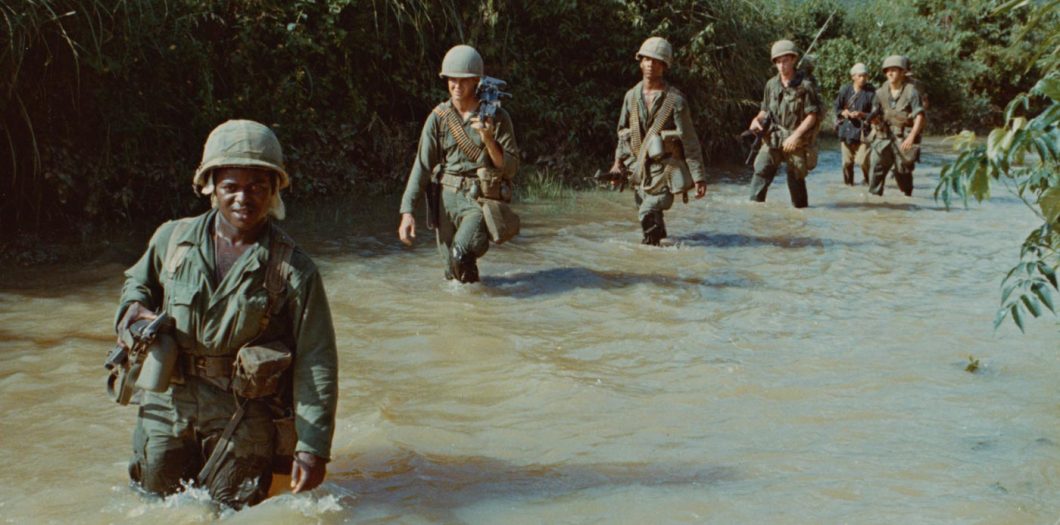Ken Burns' Vietnam
Journalists often claim to write the first draft of history, but that statement raises the question when a story turns from current events into history. The Vietnam War now stands closer to World War II than 2017. A formative experience for the baby boom generation, those who came of age after 1990 see Vietnam as an episode in history. Documentary filmmaker Ken Burns captures the immediacy of the conflict in the ten episode series The Vietnam War airing on PBS. The series also raises larger questions about American foreign policy that resonate today.
Episode one traces the background to American intervention in Vietnam, but it opens by stressing the human dimensions of the home front. Veterans of earlier wars, especially World War II, had a very different homecoming from the shock experienced by Vietnam veterans who returned to a nation divided over the struggle in Southeast Asia. The Vietnam War became the most divisive period since the Civil War. Service in the war became something kept to yourself. One veteran likens his postwar status to living with an alcoholic father whose behavior everyone carefully ignored. Max Cleland, an army veteran turned politician who lost both legs and his forearm in an accident, speaks of how those who suffered need to find meaning in their loss. His words point to a theme of baby boomers coming to grips with what they had suppressed.
Finding meaning in a succession of mistakes and miscalculations, however, seems difficult. America’s involvement with Vietnam began in secret and ended in a publically humiliating defeat. Narrator Peter Coyote describes intervention as done in good faith and with a lack of knowledge. Unwillingness to admit error—or importantly to show weakness—prolonged a costly struggle. The result brought agony for Americans that seemed to call everything into question.
Burns and his collaborator Lynn Novick elaborate the point in the October issue of the Atlantic with an argument that the Vietnam War broke the presidency by opening a credibility gap. Not only did performance fall short of promises as escalation failed to bring victory, but later revelations of private misgivings by successive presidents belied their public confidence and shattered public trust that has yet to be restored. Burns and Novick quote John Kennedy, Lyndon Johnson, and Richard Nixon at length. Kennedy had misgivings from the start, but feared the domestic political consequences of making concessions to Communists. Later he expressed regrets over the military coup against Ngô Đình Diêm and feared the new South Vietnamese government would not win popular support. Johnson likened the Vietnam War to a second Korean War, doubting it was worth fighting for and that the United States needed to get out. Unsurprisingly, Burns casts Nixon and Henry Kissinger as villains for their calculating view on managing the timing of defeat.
French colonialism with its exploitation of the Vietnamese stands out as the story’s villain. Hô Chí Minh, always more nationalist than communist, turned to communism only after reading Lenin’s attack on imperialism. It served as a means to pursue his larger end of making Vietnam independent. Ignorance of local conditions and pressures from the early Cold War operated as a tragic flaw driving the United States to support the French rather than Vietnamese independence. Burns notes the impact of Communist victory in China’s civil war followed by the Korean War. The larger story of the early Cold War ranges beyond his subject, but Britain’s effort to stabilize Greece and then Turkey before the task proved beyond its means points to the danger power vacuums posed. Officials in Washington faced challenges across the globe from unstable regions where the Soviet Union might find opportunity.
The episode quotes Hô telling Americans their country did not have a colonial empire or exploit Asian people. No grounds existed for a quarrel between the Vietnamese and the United States. He also warned against putting too much weight on communism as a force. American military advisors supported France in Harry Truman’s administration. Dwight Eisenhower privately saw no prospect of victory, but still increased aid. The need for French support in Europe mattered more than considerations in Asia. Kennedy saw the difficulty the French faced in his visit as a young congressman and concluded that the United States needed to convince the Vietnamese it cared as much about remedying injustice as fighting communism.
French public reactions to the war anticipated the American experience later with dockworkers throwing stones at soldiers landing at Marseilles. Frenchmen called it a dirty war. Burns pairs the point with the footage of Chicago police beating rioters. An American interviewee describes the scene as people who looked like his father beating people who looked like him. Emerging contention in the United States over the war widened a generation gap.
Vietnam had its own divisions. The series notes Viet Minh atrocities, especially against perceived collaborators. A brutal purge of other nationalists and targeted reactionary elements like money lenders and landowners, along with Trotskyites, preceded their war against the French. Not surprisingly, Catholics and Buddhists feared persecution. A Vietnamese woman described it as a civil war down to the family level.
The war started for America when it backed Diêm’s regime in South Vietnam. A different kind of nationalist than Hô, Ngô Đình Diêm hated both the French and the Communists who had killed his brother and nephew. Kennedy believed that having helped create South Vietnam, the United States had a responsibility to protect it. The value Washington placed on keeping Vietnam from going Communist gave Diêm an upper hand enabling the tail to wag the dog. Diêm’s overthrow and murder brought neither stability nor a way out of an increasingly problematic commitment.
Burns shows idealism leading to error, but other important points emerge. The decades after 1945 take on a different view when seen outside Cold War rivalry as the collapse of empires brought local struggles over who would succeed colonial rulers. Ideology enabled groups to bid for outside support from Washington, Moscow, and sometimes Beijing. Paris and London remained in the game with the latter often playing a weak hand more deftly than stronger rivals. Not knowing local conditions made outsiders vulnerable to being used for ends other than their own. Unwillingness to see mistakes and correct them, either from hubris or fear that lack of resolve would embolden adversaries, became a cardinal error.
Turmoil in the United States over the war coincided with the replacement of one elite by another in key institutions. Many of the protest generation came into power. Implications of that shift in academia, media, and the professions only gradually emerged during the 1990s with different values and assumptions becoming dominant. It discredited the foreign policy establishment, especially the part aligned with Democratic administrations. Besides the challenge they faced from below in their own party, they were excluded from power in four of five administrations after 1968. The consequences of that generational gap in experience became clear when Bill Clinton formed an administration in 1993.
Some observers believed victory in the 1991 Gulf War banished the Vietnam Syndrome which had constrained American foreign policy. It certainly led many to dismiss lessons about the risks of intervention and the limits to what conventional military force could accomplish. The consequences of that error remain ongoing today. Pace Burns, a pragmatic realist approach that brings at least a modicum of stability offers a better chance of regaining public confidence in Washington than a Kennedyesque idealism. Looking back on the Vietnam War offers a chance to reflect not only on that particular tragedy, but more generally on the ways miscalculation and hubris can bring disaster. Perhaps there are lessons still to be learned.


